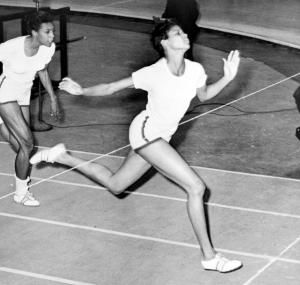Doctors were sure of one thing about Wilma Rudolph: she wouldn’t walk again. They sure were wrong about that.
Afflicted with polio as a child and consigned to leg braces, Rudolph’s determination and talent carried her to Olympic gold titles, world records, and global popularity. As we celebrate women’s contributions to history, culture, sports, and society every March during Women’s History Month, Rudolph has a compelling, incredible story.
A Tiny, Sickly Child
Born prematurely and one of 22 children in a mixed family in Tennessee, Rudolph suffered poor health as a child. She survived scarlet fever, double pneumonia, and polio. The polio rendered her left leg useless at the age of 6 and doctors fitted her with leg braces.
She didn’t care for the leg braces and kept taking them off. Brothers and sisters took turns massaging her leg and her mother made the weekly 90-mile roundtrip to Nashville for physical therapy.
Never Quit
She was relentless in her physical therapy and endured bouts of measles, chicken pox, and whooping cough. By the age of 9, she was out of the leg braces and took up basketball.
While she had talent and became an all-state player, her coach could see her ability to run. She joined a track team and took that same determination and work ethic that lifted her out of leg braces to sprinting.
Olympic Champion
At 16, she competed in the 1956 Summer Olympics in Melbourne, Australia, winning a bronze medal in the 4×100 relay. Four years later at the Rome Olympics, Rudolph became the talk of the Olympics.
She won gold and set world records in the 100, 200, and 4×100 relay, earning the title of “fastest woman in the world. Tall and lean at 5-11 and 130 pounds, spectators said if you blinked you might miss her.
When the U.S. Olympians competed across Europe that summer, it was Rudolph who the fans adored and came to watch by the thousands. She also proved to be an inspiration to the next generation of female athletes.
Florence Griffith-Joyner and Jackie Kersee, future track and field Olympic gold medalists and world record holders, were both inspired by Rudolph. Kersee would later say that she would call Rudolph at home for guidance.
Rudolph would have a movie made about her called “Wilma” and was later inducted into the Black Athletes Hall of Fame and the National Track and Field Hall of Fame. She died of cancer in 1994 in Nashville, Tennessee.
A CARING-FIRST ENVIRONMENT
Senior living communities like Bellaire at Stone Port are precisely that—a community. Residents become friends and even family, and a caring team is there to help them maintain their quality of life.
At Bellaire at Stone Port, we offer both Assisted Living and Memory Care and we care with Honesty, Excellence, Accountability, Residents first and Teamwork. We like to call it Caring with H.E.A.R.T.™!
If you believe a senior living community would benefit your loved one, get in touch with us. Schedule a visit or download a brochure today!



